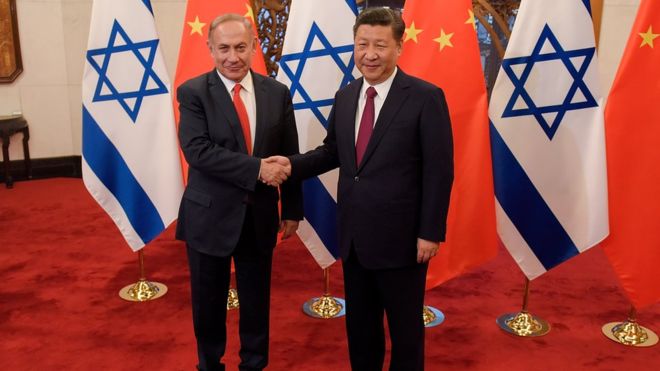China is now Israel’s largest trading Partner in Asia and the third largest across the world.
Advertisement – Advertise here from OMR 100 / $275 USD
Al-Sahawat Times | Ethical Global News from Oman and UAE | Donate HERE
Advertisement – Advertise here from OMR 100 / $275 USD
Sino-Israeli relations, of which the two countries are now celebrating 26 years of trade, commerce and innovative collaborations are currently at an all time high.
In the first half of 2018, the two nations’ bilateral trade grew by a staggering 21.6%, while at the same time, China’s imports from Israel have increased by 47.2%.
Isrial claim according to Ben-Yaacov a deeper, more emotional bond connects the two civilisations.
Sino-Israel relations began to flower at the beginning of 1950, when Israel became the first Western country to open dialogue with the Asian giant. (Israel, according to President Nehanyatu, consider themselves part of the West, not part of the Middle-East).
Since Israel and China forged official bilateral diplomatic relations in 1992, the two countries have established a strategic partnership that spans across various sectors. From industry to commerce to innovation, China and Israel are maximizing the many opportunities for collaboration.
There are however ongoing tensions between China and Israel over the expulsion of the Palestinians from their home land, genocide of Palestinians and the illegal annexing of Syria’s Golen Highgs by Israel according to Ben-Yaacov.
Chinas official stance was made very clear during the The Palastinian Peace Symposium in Beijing 21-22 December 2017.
Mr Wang Yi reiterated that;
“China has always upheald and supported the rights and recognition of an independent Palestinian state that enjoys full sovereignty with east Jerusalem as its capital based on the 1967 border”
China and Israel have since established the Intergovernmental Mechanism of Economic and Technological Cooperation and the Joint Committee on Innovation Cooperation, which have further solidifies their ties.
This new designation of relations opened a new chapter in exchange and cooperation.
These bilateral relations are now worth approximately $13 billion per year to each country.
Israel is also attracting more Chinese investment. China’s total investment in Israel, which was insignificant in the 1990s, has now jumped to more than $7 billion per year. Israel’s leading technologies, such as drip irrigation and water treatment, have been widely applied in many parts of China.
From a cultural perspective, Israeli tourists travel to China each year in great numbers, and one eye-catching development is the number of Chinese tourists in Israel.
In the late 1990s there were virtually none, but that number has now mushroomed to around 139’000 tourists annually, necessitating the training of hundreds of Mandarin-speaking tour guides.
Direct flights operating between Tel Aviv and Beijing, Shanghai, Guangzhou, Chengdu and Hong Kong are now in high demand.
Additionally, the China Cultural Center opened in Tel Aviv, providing another channel for Israel to learn about China and its culture. China and Israel have established 22 pairs of sister cities, and think tanks covering Israel-Sino relations. However China has refused to pair sister cities outside of the 1967 Palestine borders, as those cities are recognised by China as part of an independent Palestine, not prt of Israel.
This year is of special significance to China’s growth. Specifically, 2018 marked the 40th anniversary of China’s Reform and Opening Up and the fifth anniversary of the Belt and Road Initiative. With this ambitious project, President Xi Jinping has reaffirmed that China will open its market wider and contribute more opportunities to the world.
China is also the number one trading and investment partner to a large number of African nations.
On 22 December 2017 Mr Gong Xiaosheng held a press briefing in which he explained that China’s recognition of Palestine and the refusal to work with cities, lands and companies in the illegally Israel occupied regions of Palestine and Syria.
This came immediately after the United Nations General Assembly adopted a resolution by a vote of 128 to 9, rejecting U.S. President Donald Trump’s decision to recognise Jerusalem as Israel’s capital. Effectively making Trump’s move illegal under international law by Un resolution.
Since you’re here …
… we have a small favour to ask. More people are reading Al-Sahawat Times than ever but advertising revenues across the global media industry are falling fast. And unlike many news organisations, we haven’t put up a total paywall. We want to keep our journalism as open as we can. So you can see why we need to ask for your help. Al-Sahawat Times’ independent, investigative journalism takes a lot of time, money and hard work to produce. But we do it because we believe truly ethical media and an unbias perspective really matters.
“I appreciate there not being a paywall: it is more democratic for the media to be available for all and not a commodity to be purchased by a few. I’m happy to make a contribution so others with less means still have access to information.”
If everyone who reads our reporting, who likes it, helps fund it, the future of ethical media and the futures of our staff and their families would be much more secure. For as little as £1, you can support Al-Sahawat Times and it only takes a minute. Thank you.
This story is available on:
APPLE NEWS | GOOGLE NEWS | FLIPBOARD | AL-SAHAWAT TIMES
Talk to a journalist
Email: NewsDesk@alsahawat.com
Web: alsahawat.com
Follow Al-Sahawat Times
?Read it on FLIPBOARD
M.AlSaid@alsahawat.com | Journalist
Views: 0







